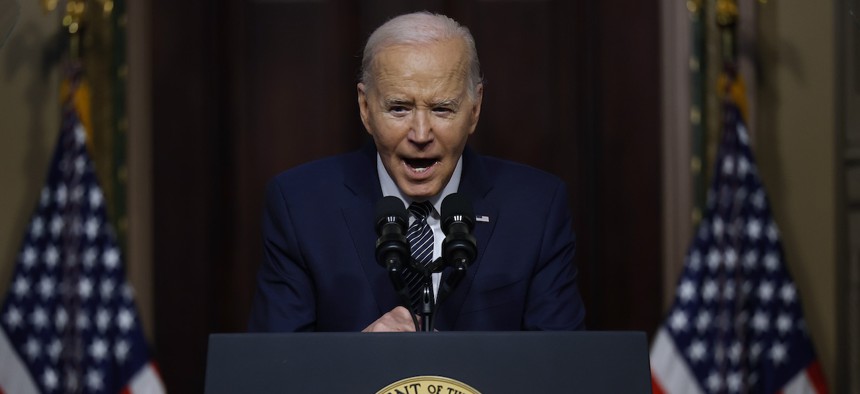
President Biden delivers remarks in the Eisenhower Executive Office Building on April 3, 2024. Chip Somodevilla/Getty Images
Employee groups laud Biden’s anti-Schedule F regulations
Unions and management organizations alike applauded the Office of Personnel Management’s effort to at least slow a future Republican administration’s efforts to strip federal employees of their civil service protections.
Unions and other organizations that represent federal employees quickly threw their support behind the Biden administration’s plan to shield the federal workforce from the potential revival of plans to strip thousands of civil servants of their due process protections.
In the waning months of the Trump administration, then-President Trump signed an executive order establishing a new job category within the federal government’s excepted service called Schedule F, for employees in policy-related jobs and exempting those positions from most civil service rules. Employees converted to Schedule F would have become effectively at-will employees.
Though no agency was able to actually implement the edict before President Biden took office and rescinded it, the initiative has remained top of mind for many Republicans. Trump has vowed to reinstate Schedule F if reelected, and GOP operatives have prepared for a quick implementation timeline, going so far as to making a list of thousands of federal employees to threaten with removal under its provisions and compiling lists of Trump loyalists to hire into newly converted jobs.
New regulations, published Thursday in the Federal Register, seek to insulate federal workers from a revival of Schedule F by stating that anyone moved involuntarily out of the competitive service retain their civil service protections, narrowing the definition of “policy-related positions” to refer strictly to political appointees rather than career federal employees, and sets up an appeals process before the Merit Systems Protection Board for any employee moved out of the competitive service or between schedules in the excepted service.
The regulations, which are set to take effect next month, received broad support Thursday from federal employee groups and good government organizations. The Partnership for Public Service called the measure a “necessary step to prevent partisan abuse of the civil service rules,” while National Treasury Employees Union National President Doreen Greenwald said it amounts to “strengthening the guard rails” around the civil service.
“Frontline federal employees are not political appointees, and for good reason,” Greenwald said. “By having basic rights such as notice of any adverse action and an opportunity to respond, they are shielded from unlawful and politically motivated firings. This is a bedrock principle of making sure day-to-day government services are provided by qualified professionals who do their job without regard to which political party holds the White House.”
Everett Kelley, national president of the American Federation of Government Employees, said the new regulations are a needed safeguard against efforts to “undermine” the nonpartisan civil service.
“One reason for the stability of our federal government is the fact that federal employees continue doing their jobs and serving the American public even as political administrations come and go,” he said. “Turning positions that demand technical expertise into political appointments based on partisan loyalty would undermine this fundamental tenet of our government and lead to chaos and corruption.”
And the Federal Managers Association, an organization representing supervisors at agencies, said it was “pleased” to see the new rules implemented.
“A hallmark of America’s civil service is the foundational, fundamental understanding that federal employees swear an oath to the U.S. Constitution and provide services to all Americans, regardless of political party,” said FMA National President Craig Carter. “The federal government cannot function effectively without this nonpolitical civil service capable of preserving institutional memory and competence across administrations.”
Not all reactions were positive, however. House Oversight and Accountability Committee Chairman James Comer, R-Ky., sought to frame the regulations as protecting poor performers from “accountability.”
“The federal workforce exists to serve the American people, yet many Americans have a deep and growing distrust of the federal bureaucracy,” he said. “The Biden administration’s rule will further undermine Americans’ confidence in their government since it allows poor performing federal workers and those who attempt to thwart the policies of a duly elected president to remain entrenched in the federal bureaucracy. We need more accountability for the unelected federal bureaucracy, not less.”







